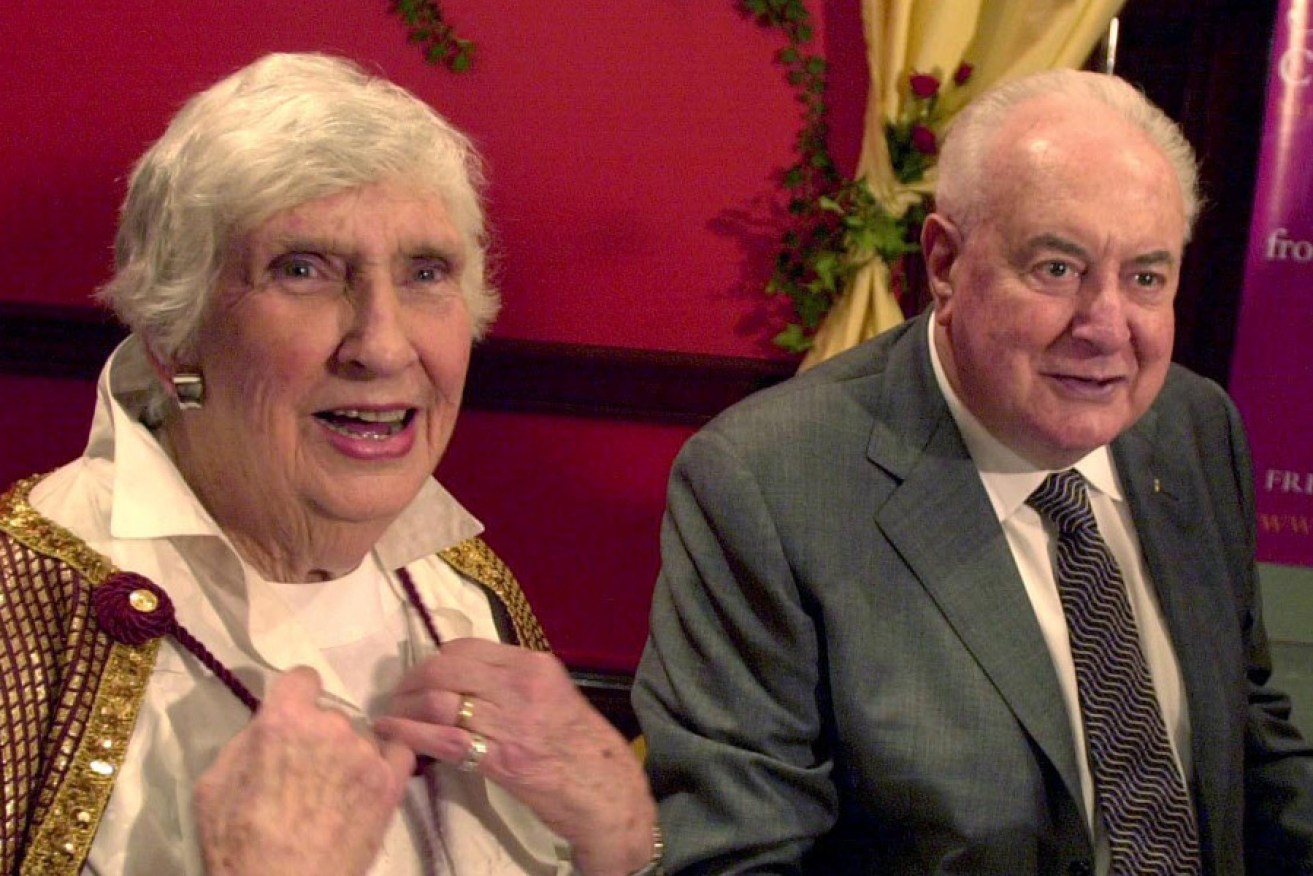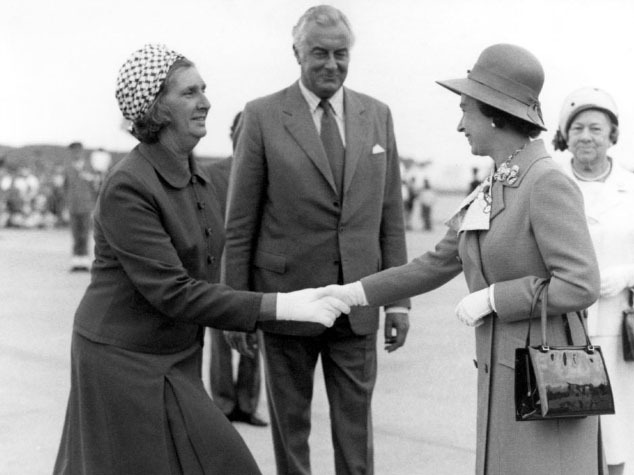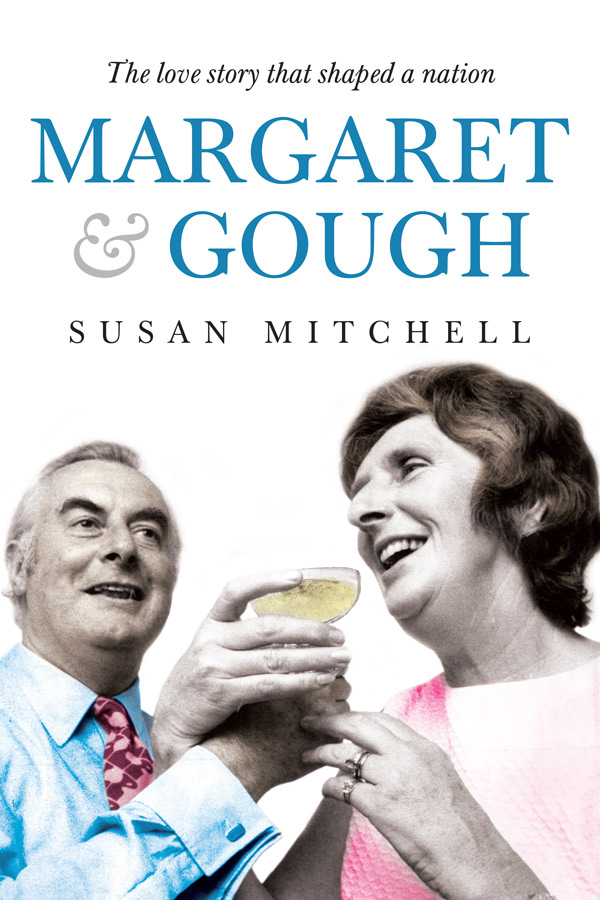Margaret and Gough Whitlam: the love story

Margaret and Gough Whitlam at the launch of the Heritage Collection at the State Library of NSW in 2003, where they performed the balcony scene from Romeo and Juliet. Photo: AAP
The love story of Margaret and Gough Whitlam is a tale of two equals whose complementary natures – him bookish and shy, her fun and vivacious – made them a formidable force, says Adelaide author Susan Mitchell.
“In terms of politics and prime ministers, there’s pre-Whitlam and post-Whitlam and we’ve never seen the likes of them again,” says Mitchell, whose new book, Margaret & Gough, is being launched tonight.
“Margaret considered herself her own person and she wasn’t just going to stand two feet behind Gough and smile like every other prime minister’s wife had done. She made it quite clear from early on: ‘I’m my own person, I have my own opinions and I’m going to express them and they won’t necessarily accord with my husband’s or the Labor Party’s’.
“And he just cheered her on … he wouldn’t have been attracted to a woman who wasn’t like that, I don’t think.”
Mitchell met the Whitlams in the late 1970s while working on her book The Matriarchs, in which Margaret Whitlam featured. They became friends and she later wrote Margaret’s biography. It was the enormous amount of additional material she amassed through her research and talking with the couple, their children and personal friends that sparked the idea of further book about the Whitlams’ 70-year relationship, which also draws on the resource of Jenny Hocking’s biography of Gough.
“I realised there was another story and it was them. They had become this other entity, and everything that he did wouldn’t have happened without Margaret by his side, and she wouldn’t have become who she did without him, either.”
The launch of the new book had already been scheduled for tonight before Gough Whitlam’s death a week ago at the age of 98, two years after he lost his beloved wife. Now, Mitchell hopes it will be seen as a tribute to them both.
While a significant part of Margaret & Gough is dedicated to the political events that shaped the Whitlams’ lives, it is the personal anecdotes and stories that offer the most colourful insights.
Mitchell had access to the diaries Margaret wrote during her time as a single young woman navigating the Sydney social scene, where she felt a certain insecurity about her unusual height. Soon after meeting her husband-to-be, she pondered:
“I wonder if Goff [sic] really likes me or just thinks he does because I am tall.”
Margaret stopped writing the diaries before her marriage in 1942, but aged in her 80s she happily shared with her biographer even the most intimate details of her relationship – including her honeymoon. Gough was more reluctant to discuss personal information.
“I had to interview him separately, of course,” Mitchell says. “We went into his office. I said: ‘I’m going to ask you some personal questions and you’ll do your best to avoid them.’ And he said: ‘Yes, and I know you’ll do your best to hammer me down.’ I said: ‘I will.’ And he laughed. His weakness was that he was easily flattered, so I just said: ‘Well, Margaret said you’re a fabulous lover’, which was true, and he said [she imitates the deep voice]: ‘And indeed, so is she’.”
At the same time, however, Margaret never hesitated to let her husband know if she thought he had “crossed a line”.
“She did that very early on in their marriage,” Mitchell says. “They went to a party and he was paying more attention to someone else than her and he was about to ask this person to dance again, and she wasn’t jealous, she just thought it wasn’t proper … so she said: ‘I told him that he was a lazy lover and he never did it again’.”
The Whitlams shared an interest in theatre, having first met at a Sydney University Dramatic Society Christmas party, and Mitchell says much of Gough’s confidence and bravura was a performance. Underneath, he was very shy, absorbed by books and ideas, and described by his wife as somewhat naïve.
“And Margaret was just brilliant at meeting people and making them feel comfortable. He knew that while he was with her, everything would run smoothly, so he didn’t have to worry about being shy.”

The Whitlams meeting Queen Elizabeth II at the opening of the Opera House in Sydney in 1973. Photo AAP/National Archives
One of Margaret Whitlam’s regrets was that she was not with her husband at the time of his dismissal in 1975 by Governor-General John Kerr. In fact, Mitchell believes that if she had been, things may have turned out differently.
“I’m convinced it wouldn’t have happened if she had been there because she was very cool, calm and collected. I mean, he was in shock … he could not believe it. It was the entrapment and the betrayal that just knocked him for six.
“If she had been there in the Lodge with him, she would have said, ‘Has anybody rung Ken Wriedt, who was the head of the Senate, because [if they had informed him of the dismissal] he wouldn’t have passed the supply bill so it wouldn’t have gone ahead and you can’t govern without the money.”
Nonetheless, there were no recriminations, and Mitchell says the strength of the Whitlams’ relationship helped them get through the tumultuous events that had left Gough “a broken man”.
“Richard Butler went to work for him [as his principal private secretary] and he told me that he was in despair and that it was Margaret and her love that actually healed him. She wouldn’t let him become morose or bitter. Her thing was, ‘We have to move on; we still have a life, we have to live it’.”
They were also steadfast in their belief in each other, says Mitchell, with Gough especially proud that Margaret’s contribution was also recognised when they were both made life members of the Labor Party in 2007.
Mitchell says both Whitlams had an excellent sense of humour, and there was no shortage of laughter in their relationship. Their greatest pleasure was spending time together, right up to the end of their lives.
“What I used to love in Sydney was going to the opera, and you’d sit down and you’d look down and they always had the same seats … and there’d be these two snowy heads and the heads would be together.
“It wasn’t like people who had been married for 60 years and didn’t speak or just passed the program to each other or something; they’d be reading and talking and laughing.”
When Margaret was in hospital after suffering heart failure in 2004, Gough was lost. Asked how he would cope without her, he quoted the lines from a song from My Fair Lady: “I’ve grown accustomed to her face, she almost makes the day begin”.
“The day wouldn’t begin for him without seeing her face,” says Mitchell. “They were always together; he wouldn’t have spent a day apart from her unless he had to.”
Eight years later, Margaret died after suffering a fall. Gough, who by then was in a wheelchair and living in a managed care centre, was bereft. It was the final chapter of a relationship which, in the words of Mitchell’s book, “shaped a nation”. It also marks the final chapter of Margaret & Gough.
“When you get to the end, if you don’t cry I’ll think I’ve failed.”
Margaret & Gough – The Love Story that Shaped a Nation, by Susan Mitchell, (Hachette Australia, $32.99) is being launched tonight by SA Premier Jay Weatherill at the Circulating Library on North Terrace.
Susan Mitchell will be speak at an Adelaide Writers’ Week session on March 4, 2015.





